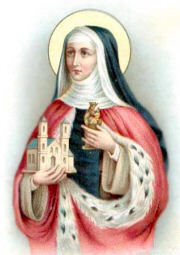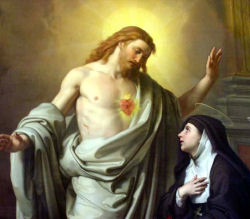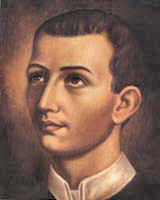The Baptism of Christ
early 16th century
Tempera on canvas and wood, 25 x 20 cm
Pinacoteca, Vatican

Collect: Grant, we pray, almighty God, that the revered intercession of Saint Hedwig may bring us heavenly aid, just as her wonderful life is an example of humility for all. Through our Lord Jesus Christ, your Son, who lives and reigns with you in the unity of the Holy Spirit, one God, for ever and ever.
Pour out on us, we pray, O Lord, the spirit with which you so remarkably endowed Saint Margaret Mary, so that we may come to know that love of Christ which surpasses all understanding and be utterly filled with your fullness. Through our Lord Jesus Christ, your Son, who lives and reigns with you in the unity of the Holy Spirit, one God, for ever and ever.
Old Calendar: St. Hedwig, widow; St. Gerard Majella (Hist)
Hedwig (1174-1243), the aunt of St. Elizabeth of Hungary, was married at an early age to Henry, Duke of Silesia. After their six children had been born, they both strove to advance in sanctity and to enrich Silesia and Poland with monasteries, hospitals, and leper asylums. When Henry died in 1238, Hedwig took the habit of the Cistercian nuns at Trebnitz (where one of her daughters was the abbess), but retained the administration of her property so that she could give personal relief to the suffering.
After a girlhood marked by painful illness and even more painful family discord, Margaret Mary Alacoque (1647-1690) entered the Visitation convent of Paray-le-Monial, France, at the age of 22. She was ignorant, sickly, and clumsy, but she had great charity and humility. Our Lord chose her to spread devotion to his Sacred Heart, at a time when rebellion without (Protestantism) and heresy within (Jansenism) were doing their best to separate Catholics from their faith and their God.
According to the 1962 Missal of Bl. John XXIII the Extraordinary Form of the Roman Rite, the feast of St. Margaret Mary is celebrated on October 17. St. Gerard Majella, listed in the Roman Martyrology, was a native of Muro in southern Italy. He was apprenticed to a tailor before asking to be received by the Redemptorists as a lay-brother. He continued his trade in the monastery, where he soon attracted the attention of St. Alphonsus de Liguori, who shortened his novitiate. His wonderful and well authenticated life was a series of supernatural phenomena — bilocations, reading of consciences, prophecies, multiplying of food, etc. He was canonized in 1904 and is the patron of expectant mothers and unborn children.
St. Hedwig Hedwig was born in 1174 in Bavaria, the daughter of the Duke of Croatia. She was the maternal aunt of St. Elizabeth of Hungary. She married Duke Henry of Silesia and raised seven children, with the boys being quite a handful. She outlived all but one of her children, Gertrude. Hedwig persuaded her husband to use her dowry to found a Cisterian monastery for nuns at Trebnitz. Their daughter Gertrude later became abbess of the monastery.
Hedwig was born in 1174 in Bavaria, the daughter of the Duke of Croatia. She was the maternal aunt of St. Elizabeth of Hungary. She married Duke Henry of Silesia and raised seven children, with the boys being quite a handful. She outlived all but one of her children, Gertrude. Hedwig persuaded her husband to use her dowry to found a Cisterian monastery for nuns at Trebnitz. Their daughter Gertrude later became abbess of the monastery.
Hedwig led a life of piety and solicitude for the sick and poor, including their religious education. She lived a life of poverty and humility, despite her prominent position. Every day, even in winter, she would walk barefooted, so her feet were in bad shape. A story tells us her husband sent her a pair of shoes, insisting that she not be without them — so she kept them under her arm. After the death of her husband Hedwig completely renounced the world and entered the monastery of Trebnitz which she had founded. She died on October 15, 1243 and is venerated as patroness of Poland. She is not to be confused with St. Hedwig, Queen of Poland (1371-1399), canonized by John Paul II. (Her feast day is February 28.)
Patron: Bavaria; brides; duchesses; death of children; marital problems; Silesia; victims of jealousy; widows.
Symbols: noble lady holding statue of Virgin and Child; noble lady holding a church (symbol of monastery); lady holding pair of shoes under arm.
Things to Do:
When the son of a prominent judge was still unable to walk at eight years of age, his mother brought the boy to the grave of St. Hedwig in her arms and was praying to St. Hedwig to heal him when, lo!, a miracle happened. In the presence of the priest who baptized him and the abbess of the monastery, the boy suddenly stood up, took an egg that lay before him and walked around the saint's grave. The abbess took other decorated eggs and threw them at the feet of the young boy, compelling him to walk further from the tomb. This miracle is said to have happened near Easter between 1274 and 1287" (p. 107, Polish Customs, Traditions, & Folklore by Sophie Hodorowicz Knab).
St. Margaret Mary Alacoque A self-effacing nun in the Visitation Convent at Paray-le-Monial, France, was inspired by the Lord Jesus to establish the devotion of the Holy Hour. Her name was St. Margaret Mary Alacoque, and from the age of seven, when she received her first Holy Communion, she had always manifested an intense love of the Most Blessed Sacrament. Our Lord appeared to her often, usually as the Crucified Christ. Her simplicity caused her to feel that these apparitions were also granted to others who had recourse to Jesus in the sacrament of His love. Once the Master appeared to the young girl as she was returning from a dance and reproached her for not espousing Him.
A self-effacing nun in the Visitation Convent at Paray-le-Monial, France, was inspired by the Lord Jesus to establish the devotion of the Holy Hour. Her name was St. Margaret Mary Alacoque, and from the age of seven, when she received her first Holy Communion, she had always manifested an intense love of the Most Blessed Sacrament. Our Lord appeared to her often, usually as the Crucified Christ. Her simplicity caused her to feel that these apparitions were also granted to others who had recourse to Jesus in the sacrament of His love. Once the Master appeared to the young girl as she was returning from a dance and reproached her for not espousing Him.
When twenty-four years of age, Margaret entered the cloister, choosing the most menial tasks. Gifted with intelligence and common sense, she made great progress in holiness. Our Lord entrusted to her the mission of establishing the reign of the Sacred Heart among the children of men. Criticism did not hamper her zeal, and her charity toward her opponents won them over to the cause of the Master.
In the first revelation of the Sacred Heart to the nun, Our Lord made known His burning desire to be loved by all men, and His design of manifesting to them His Sacred Heart with its treasures of mercy. Margaret Mary communicated Our Lord's wish that the faithful receive Holy Communion on the first Friday of each month and observe the Feast of the Sacred Heart on the Friday after the octave of Corpus Christi.
After nineteen years in the convent, St. Margaret Mary died October 17, 1690. Many pilgrims to her tomb have sought and obtained favors. Through her apostolate of devotion to the Sacred Heart many sinners have repented and found grace with God.
Patron: against polio; devotees of the Sacred Heart; loss of parents; polio patients.
Symbols: nun in habit of the Order of the Visitation and holding a flaming heart; nun in habit of the Order of the Visitation and kneeling before Jesus exposing His heart to her; Sacred Heart; heart.
Things to Do:
St. Gerard Majella St. Gerard was born in southern Italy on April 6, 1726. His father died while Gerard was still young, forcing him to be apprenticed to a tailor. His frail health, quiet disposition, and gentle ways led him to being bullied by fellow workers and by his employers.
St. Gerard was born in southern Italy on April 6, 1726. His father died while Gerard was still young, forcing him to be apprenticed to a tailor. His frail health, quiet disposition, and gentle ways led him to being bullied by fellow workers and by his employers.
He was refused admission to the Capuchin Order on account of his youth, so he lived for a time as a hermit. His great love for Jesus crucified caused him to lead a very ascetical lifestyle. Getting to know the Redemptorists, he applied to them but was initially rejected because of his poor health. On his insisting, however, he was reluctantly accepted and sent to the novitiate with a note saying: "I am sending you a useless lay brother."
Gerard was professed in July 1752, and quickly disproved the prediction of his uselessness by his excellent service as porter, tailor, and sacristan. His prayerfulness and dedication began to be too great to overlook and so he gained a reputation for sanctity. This brought a large number of persons to him for guidance in the spiritual life. He readily responded, revealing a remarkable gift for sensing the deep interior reality of a person. Because of this genius, of his ability to bring relief to the sick, and of his care for women in childbirth, many miracles were attributed to him and he gained the nickname "The Wonderworker."
His popularity eventually led to accusations of sexual misconduct, which he bore patiently until they were proven false.
He died on October 16, 1755, worn out by his austerities and by tuberculosis. Very many Catholics throughout the world honor him as the special patron of new mothers and of families, and his reputation as "The Wonderworker" continues to our day. — The Redemptorists
Patron: Childbirth; children; expectant mothers; falsely accused people; good confessions; lay brothers; motherhood; mothers; pregnant women; pro-life movement; unborn children.
Things to Do: